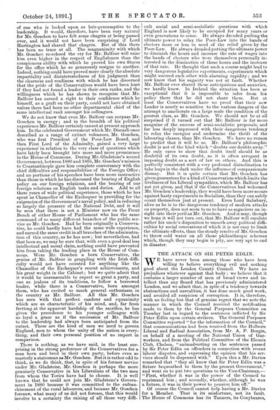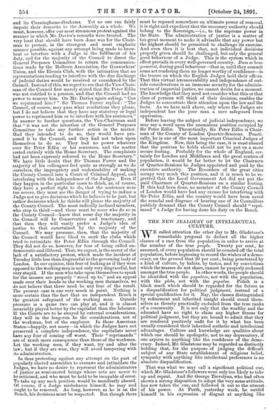THE ATTACK ON SIR PETER EDLIN. Nv E have never been
among those who have been willing to believe everything evil and nothing good about the London County Council. We have no prejudices whatever against that body ; we believe that it contains a larger number of men of broad views and in- tellect than any Board that has previously administered London, and we admit that, in spite of a tendency towards abstractions and unrealities, it has done much good work, and avoided all suspicion of corruption. It is, therefore, with no feeling but that of genuine regret that we note the manner in which the Council received the notification made to them by the General Purposes Committee on Tuesday last in regard to the sentences inflicted by Sir Peter Edlin upon certain strikers. The General Purposes Committee reported " for the information of the Council," that communications had been received from the Holborn Liberal and Radical Association, from Mr. A. P. Borgie, on behalf of a meeting of the National Union of Gas- workers, and from the Political Committee of the Eleusis Club, Chelsea, " animadverting on the sentences passed by Sir Peter Edlin on offenders in connection with recent labour disputes, and expressing the opinion that his ser- vices should be dispensed with." Upon this a Mr. Davies remarked that " they all knew that Sir Peter Edlin was a fixture bequeathed to them by the present Government," and went on to put two questions to the Vice-Chairman,— " First, whether it was in the power of the Council to reprimand him ; and secondly, whether, although he was a fixture, it was in their power to pension him off."
Of course the Council cannot help having a Mr. Davies for a Member. That is its misfortune, not its fault. The House of Commons has its Tanners, its Conybeares, and its Cunninghame-Grahams. Yet no one can fairly impute their demerits to the Assembly as a whole. We must, however, offer our most strenuous protest against the manner in which Mr. Davies's remarks were treated. The very least that should have been done was for the Chair- man to protest, in the strongest and most emphatic manner possible, against any attempt being made to brow- beat or interfere with a Judge in the fulfilment of his duty, and for the majority of the Council to direct the General Purposes Committee to return the communica- tions made by the Holborn Association, the Gasworkers' Union, and the Eleusis Club, with the intimation that no representations tending to interfere with the due discharge of judicial duties would be received or considered by the Council. Instead of this, we regret to see that the Vice-Chair- man of the Council first merely stated that Sir Peter Edlin was not entitled to a pension, and that the Council had no power to remove him. On Mr. Davies again asking, " Can we reprimand him ? " Sir Thomas Farrer replied : " The. Council, of course, may pass what resolutions they please, but I do not believe that they have any statutory or legal power to reprimand him or to interfere with his sentences." In answer to further questions, the Vice-Chairman said that " it was not the intention of the General Purposes Committee to take any further action in the matter. Had they intended to do so, they would have pro- posed it to the Council, and they had not taken upon themselves to do so. They had no power whatever over Sir Peter Edlin or his sentences, and the matter rested entirely with the Home Secretary. The complaints had not been expressly referred to the Home Secretary." We have little doubt that Sir Thomas Farrer and the majority of his colleagues feel quite as strongly as we do ourselves, the impropriety and undesirability of making the County Council into a Court of Criminal Appeal, and interfering with the independence of the Judges. Even if they happen in the particular eases to think, as, of course, they have a perfect right to do, that the sentences were too severe, they must see the danger of trying to induce a Judge not to give decisions which he believes to be just, but rather decisions which he thinks will please the majority of the County Council. The most radically inclined members, who stop to think—and there must be some who do so in the County Council—know that some day the majority in the Council will be Conservative and reactionary, and that then they will vastly prefer a Judge's idea of justice to that entertained by the majority of the Council. We may presume, then, that the majority of the Council would have liked to snub the clubs which tried to intimidate Sir Peter Edlin through the Council. They did not do so, however, for fear of being called un- democratic and illiberal. That, we expect, is the secret of the lack of a satisfactory protest, which made the incident of Tuesday little less than disgraceful to the governing body of London. In our opinion, this fear of looking as if they were opposed to the working men is not only very disgraceful, but very stupid. If the men who take upon themselves to speak for the masses are properly " stood up to," and an appeal made over their heads to the working men themselves, we do not believe that there need be any fear of the result. The present case is one very much in point. Nothing is more certain than the fact that an independent Bench is the greatest safeguard of the working man. Outside pressure is a game two can play at, and it is almost invariably played better by the capitalist than the labourer. If the Courts are to be swayed by external considerations, they will in the long-run be the considerations, not of the workman, but of the employer. In those American States—happily, not many—in which the Judges have not preserved a complete independence, the capitalists never have any fear of coming off worst. Their " reprimands " are of much more consequence than those of the workmen. Let the working men, if they want, try and alter the law ; but if they are wise, they will avoid tampering with its administration.
In thus protesting against any attempt on the part of popularly elected assemblies to overawe and intimidate the Judges, we have no desire to represent the administrators of justice as semi-sacred beings whose acts are never to be criticised, and who must be held to be incapable of error. To take up any such position would be manifestly absurd. Of course, if a Judge misbehaves himself, he may and ought to be removed. As long, however, as he is on the Bench, his decisions must be respected. But though there must be reposed somewhere an ultimate power of removal, it is right and expedient that the necessary authority should belong to the Sovereign,—i.e., to the supreme power in the State. The administration of justice is a matter of too great moment to make it advisable that any power but the highest should be permitted to challenge its exercise. And even then it is beat that, not individual decisions properly given should be challenged, but only the general good behaviour of a Judge. This is the system which in effect prevails in every well-governed country. Dum se bene gesserint, during good behaviour—that is, until they commit some act rendering them no longer worthy of confidence—is the tenure on which the English Judges hold their offices. That this virtual irremoveability and independence of out- side considerations is an immense security for the adminis- tration of impartial justice, we cannot doubt for a moment. The knowledge that they need not consider what this or that class of persons will think of their decision, enables the Judges to concentrate their attention upon the law and the facts. As we have said above, only where the Judges are independent has the poor man a sure safeguard from oppression.
Before leaving the subject of judicial independence, we may say a word upon the anomalous position occupied by Sir Peter Edlin. Theoretically, Sir. Peter Edlin is Chair- man of the County of London Quarter-Sessions. Practi- cally, he is one of the most important Criminal Judges of the Kingdom. Now, this being the case, it is most absurd that the position he holds should not be put on a more secure footing. Probably for the whole of England, cer- tainly for London and Middlesex and the great centres of population, it would be far better to let the Chairmen of Quarter-Sessions be Judges appointed and paid by the executive authority. The Recorders of the great cities occupy very much this position, and it is much to be re- gretted that the Local Government Act did not put the paid Chairmen of Quarter-Sessions on a similar footing. If this had been done, no member of the County Council of London would have had any excuse for interfering with Sir Peter Edlin, and the country would have been saved the scandal and disgrace of hearing one of its Councillors publicly demand that the County Council should" repri- mand ' a Judge for having done his duty on the Bench.



































 Previous page
Previous page